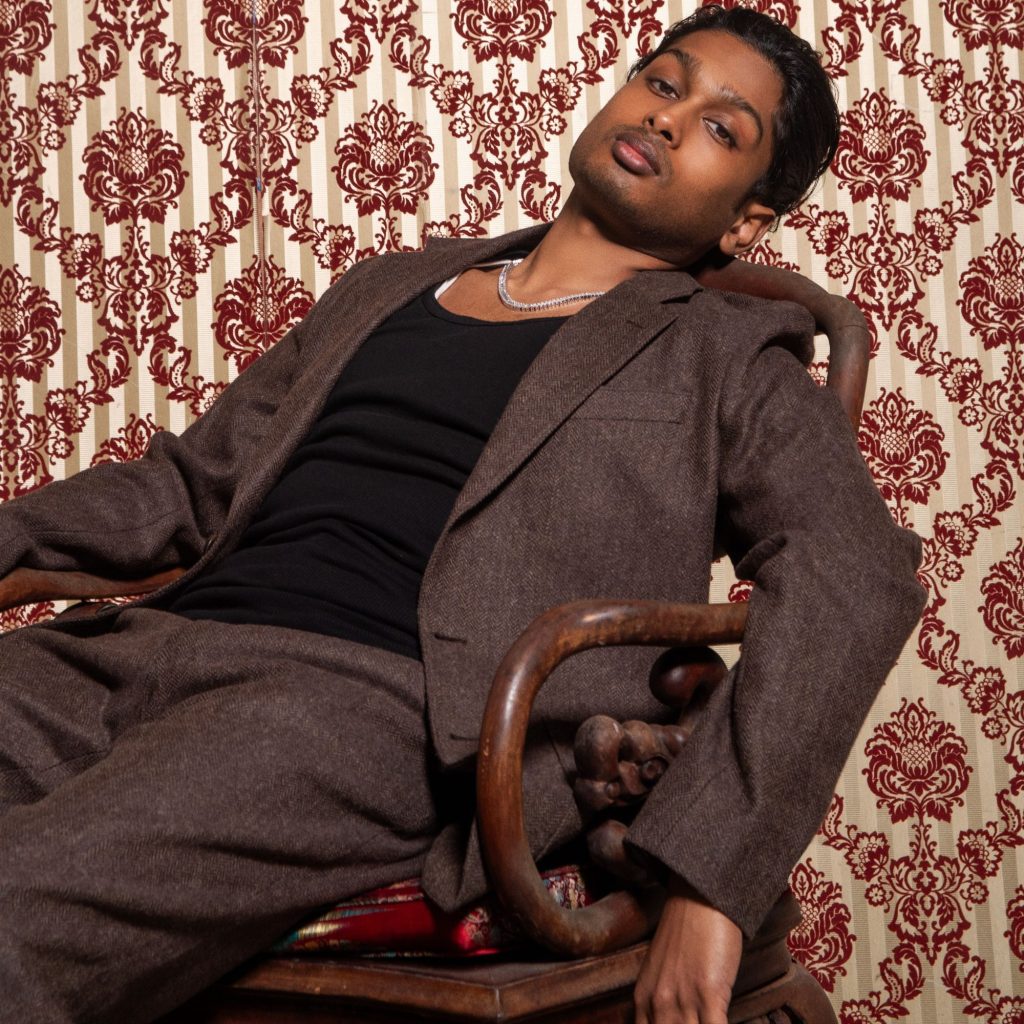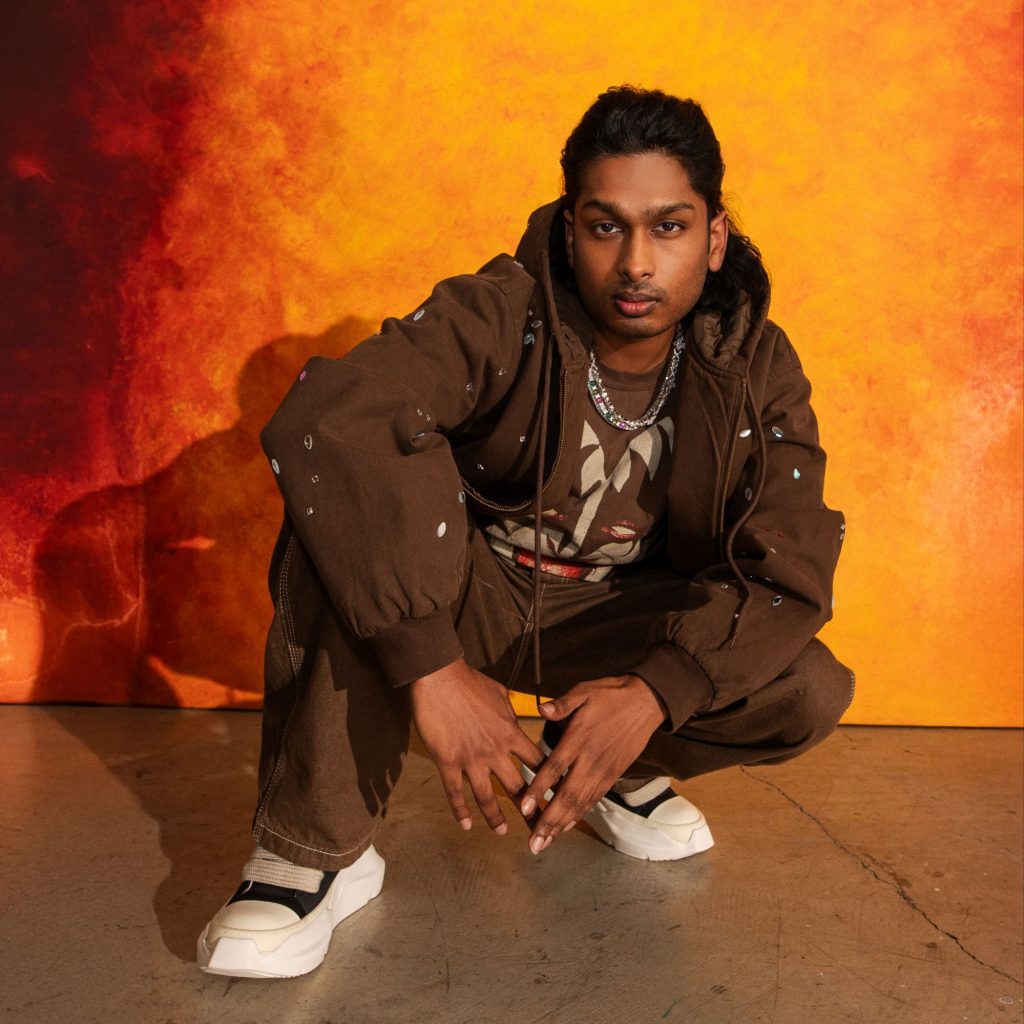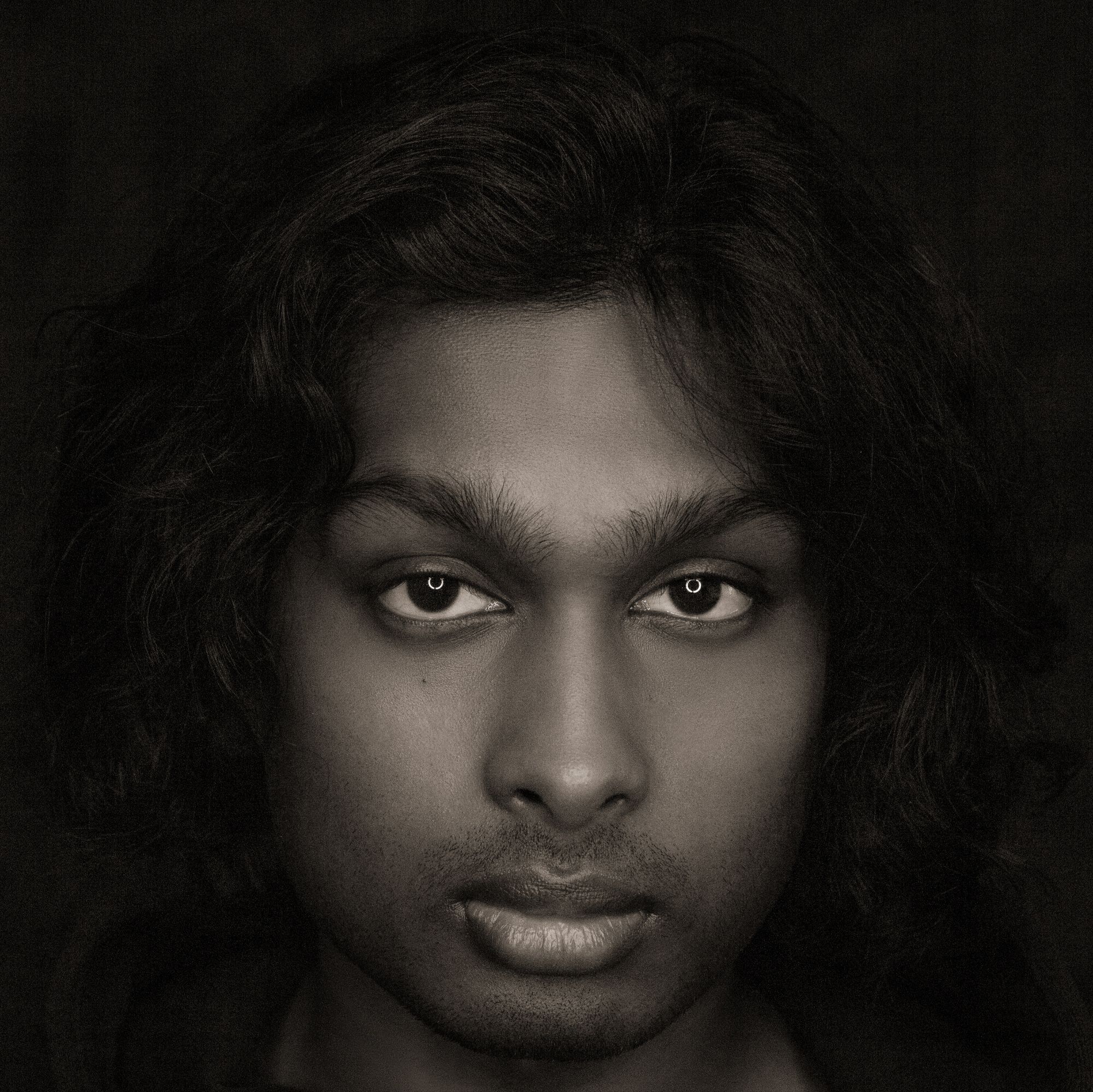A prolific musician who offers an unparalleled sound recently had the opportunity to sit down with us. Ashwin Gane is an artist’s artist. His insatiable desire to achieve success in an overcrowded industry is motivating, but what distinguishes this talent from others is that he wears multiple hats: singer, rapper, producer, and songwriter. To no surprise, he has worked with several heavyweights, and it’s apparent that he will continue on this path.
As a fellow Detroiter (MLK High School, Cranbrook Kingswood Horizons Upward Bound), I understand how the city has impacted the culture, especially when it comes to R&B and hip-hop. What percentage of your music has been influenced by Detroit vs. India?
I wouldn’t say my music is directly influenced by either Detroit or India in the traditional sense, but they’ve shaped me in different ways.
When it comes to Detroit, I actually think Michigan as a whole has had a bigger influence on me—more of that Midwest spirit, the humility, even the weather. A lot of my music has a wintry feel to it, which you can hear in some of my earlier work, like Twilight or Outside. So, in that sense, I’d say I’m influenced more by being a Michigander than specifically Detroit. But if we’re being particular, there’s one artist out of Detroit who’s had a big impact on me, and we all know who he is—Eminem. His aggression, storytelling, the use of an alter ego, and even his comic relief—those elements resonated with me. Take Who’s Watching, for example—it’s got a comical edge that reflects some of that influence.
As for India, I wouldn’t say my music directly incorporates Indian elements, but being raised by immigrant parents from India definitely shaped my work ethic. That relentless drive, that mindset of putting in the hours, it’s all I’ve ever known, and that naturally carries over into my music. But sonically, I don’t really use Indian cues as of yet. Western and Eastern music operate by different rules: Indian music is often microtonal, meaning you can glide between notes, while Western music, especially in pop and hip-hop, is much more tonic and structured. Microtonality takes deep study, and my background is more rooted in Western classical music, which you can really hear in a song like Regret It with its gothic choir, cathedral organ, and symphonic string section.
What I think is an advantage is that I was raised hearing Eastern music, so it naturally opened me up to different cultures. I don’t box myself into just American or Detroit sounds. For example, on Flip Dat and even Lately, I pulled inspiration from flamenco and Latin music So instead of a percentage, I’d say my influences come from a mix of different cultures and styles, filtered through my own lens.
What was it like growing up in Detroit? Siblings? Can you walk us through your educational track? Do you feel that helped with your wordplay, lyrics, and tonality?
When you say Detroit, it would really be Metro-Detroit because I actually grew up in Farmington Hills for about 13 years before moving to Bloomfield Hills. It was your typical Midwestern experience: suburbia, safe but not the most exciting. I spent a lot of time with my neighborhood best friend and my cousins, who were also my best friends.
Even early on, I was always drawn to my imagination. I used to LARP, live-action role-playing, before I even knew that’s what it was called. I read a lot then, and I still do now. Which has shaped me tremendously to this day. I think part of why I was so into exploring both knowledge and my creativity was because, in a place like that, you have to create your own excitement. It wasn’t a big city with constant stimulation, so I made my own worlds.
As for siblings, no, I’m an only child, so all the love and expectations were mine, right?
Now, when it comes to my educational track, I’ve always had twin interests—science and the arts. Music and film don’t require a degree, but science does, so I pursued that academically. I went to the University of Michigan, Ann Arbor, and Wayne State, where I earned a BS in Biological Sciences, graduating magna cum laude.
I’ve always loved science, especially biology and zoology.
Did that influence my music? I think with or without school, I’d still be the same because I naturally have an academic and structured mindset. But studying science did reinforce that. Music isn’t just art—it has a science to it. There’s a structure, a method to replicate results, just like in research and development. Having that disciplined, analytical approach helps me refine my work. So while school didn’t create that in me, it definitely enhanced it.
A few of our team members hail from India as well. Can you expound on your heritage? Punjabi? Sindhi? Jain? Do you visit often?
So yes, my family originates from Tamil Nadu, a state in southern India. So that would make me Tamol and yes I have visited quite often mainly to see my relatives and also for tourism purposes. I think I may have been to India ten times by now. The funny thing is I can’t even speak Tamil properly, so it’s a fish out of water experience!
You’ve worked with industry heavyweights like Scott Storch. What has been one of the most gratifying experiences working alongside some of the greats, and why?
When I got the news that I’d be working with Scott Storch, I got goosebumps. This is the guy behind some of the most iconic songs of all time: Still D.R.E., Lean Back, Cry Me a River—tracks I grew up listening to. SoI was really in awe when I first got in the room with himl. Even now, it still feels a little surreal, definitely a bit of a hero-worship situation, if you will.
And then, when I actually got in the studio with him, what really stood out was his honesty. After hearing my work, he straight-up told me that I had already mastered symphonic orchestration—that I had taken what he and Dr. Dre was doing in the ’90s and refined the formula. He didn’t try to teach me something I already knew. Instead, he focused on helping me expand into new genres where I could grow. That kind of insight and humility is rare, and it made me respect him even more.
One of the biggest things I learned from Scott is that there’s no magic wand, no secret sauce, no voodoo to making great music. A lot of people think there’s some hidden formula that legends have, but it’s really as simple as making the best music you can—music that’s catchy, that sticks with people. That’s it. Even Scott, as legendary as he is, follows the same fundamental process: create, refine, trust your ear.
And yeah, we definitely have some heat coming on the way. Very different vibes than what you’re used to from me—covering different genres, different sounds. Gotta keep it fresh. I’m excited for people to hear what we cooked up.
If you looked in the mirror and spoke to the 14-year-old version of yourself, what would you say to him?
If I could talk to my 14-year-old self, the first thing I’d tell him is: trust your instincts. Most of the time, you’re right. A lot of people are going to try to get in your head, but don’t let them. They don’t see the vision yet but they will.
I’d also tell him, start rapping and songwriting now. You don’t know it yet, but you’re heading down that road. The sooner you start, the more advanced you’ll be. Same with film—pick up the camera now. Just take the leap. I’d also implore my younger self to look at social media as a tool as opposed to a distraction and learn to master it to broadcast your creativity.
But above all, don’t let doubt creep in. Take the chances, face the scary situations, and trust that you’ll come out stronger every time. Because in the end, you will become the person you dreamed of becoming.
Your sound is an eclectic blend of hip-hop, R&B, and trap. How did you develop such a distinctive level of musicality?
My sound is eclectic because, first and foremost, I’m highly perceptive. I naturally pick up on details that make things stand out—whether it’s a subtle nuance in production or a flaw that needs fixing. That ability extends to music, allowing me to refine my sound in a way that feels distinct.
Now, I could tell you the usual—put in the work, learn the skills—but we all know that. Skill is only part of the equation. What really sets an artist apart is vision. And vision isn’t something you can just practice it comes from allowing your imagination to run free. If you become close-minded, you’ll just end up copying everyone else. After all, art is about creating something new, about bringing a fresh experience to the table.
In terms of how I built my skills? YouTube and Google Academy—that’s how I learned. But beyond technique, it’s about taste. You have to hear mistakes, be willing to correct them, and refine your craft continuously.
You mentioned hip-hop, R&B, and trap—and yes, that blend is definitely present on the Got It EP. But I would characterize my signature sound as something different. It’s Western classical music fused with hip-hop. If you listen to Twilight or Regret It, you’ll hear it—the gothic choirs, the symphonic orchestras, the cathedral organs. It’s cinematic in nature. Even in Lately and Flip Dat, you can hear those atmospheric, film-like synth layers coming in near the end.
I also pull from other influences—psychedelic sounds, flamenco guitar, Latin, and Spanish music. But at my core, what truly defines my sound is that cinematic orchestral fusion with hip-hop. It’s about building a world with sound, crafting something larger than just a beat and melody. That’s what makes it distinct.
If you could collaborate with one artist of the moment, who would it be and why?
If I could collaborate with any artist in the world, it would be The Weeknd, now known as Abel Tesfaye. First and foremost, it’s the emotion in his voice—the sheer rawness and vulnerability he brings to his performances. His vocal tone is almost angelic, yet there’s always this underlying darkness, this weight of emotion that makes his delivery feel hauntingly real. That contrast between beauty and pain is something I deeply connect with.
Beyond that, The Weeknd and I share a similar approach to world-building in music. He doesn’t just make songs—he creates entire cinematic experiences. His albums feel like immersive stories, whether it’s the neon-drenched dystopia of After Hours or the eerie, synth-driven paranoia of Trilogy. I resonate with that because I’m doing something similar—if you listen to Twilight and Regret It, you’ll hear what I consider the prologue to my own cinematic universe. We both take inspiration from film and use sound to build larger-than-life atmospheres.
Musically, I think our voices would complement each other in an interesting way. His voice has this airy, ethereal quality, almost floating above the production, while mine is much deeper and heavier, more grounded. That contrast—his weightless falsetto against my darker, more resonant tone—could create something truly unique.
At the end of the day, The Weeknd isn’t just one of my favorite artists right now—he might be one of my favorites of all time. A collaboration between us wouldn’t just be a song; it would be a full-fledged cinematic event!
Recently, you signed with the prestigious CAA. What was going through your mind when you inked that deal?
So, recently, I signed with CAA, and when I inked the deal, what was going through my mind? Honestly—”Of course.”
Not in an arrogant way—just in a this was bound to happen way. I’ve always known where I’m headed.
Now, don’t get me wrong—it’s a huge milestone. CAA represents some of the biggest names in the game, and having them in my corner is a major power move. But at the same time, I’ve always known where I’m headed. So when the moment came, I wasn’t surprised—I was ready.
I think that’s the difference between hoping for something and knowing you’re built for it. I’ve put in the work, sharpened my craft, and positioned myself for success. Signing with CAA was just another step toward the vision I’ve always had.
So, yeah, no crazy celebration, no emotional breakdown—just a quiet “Of course.” And then it was back to work.
Is there anything we haven’t touched on that you’d like to shed light on? Community involvement? Any special projects or endorsements on the horizon?
Well, for one, you can expect a special guest remix for Flip Dat—and maybe even Who’s Watching. I can’t give it away just yet, but trust me, you’re going to find out soon.
Of course, if you haven’t already, go listen to Got It, the EP, out on all streaming platforms. We’ve already dropped three music videos, and there might be two more on the way. But more than that, I want to make it clear—this is just the warm-up. I’m just getting started.
In fact, you can expect a lot more output from me this year. I’ve got an upcoming EP called Twilight Tales, which serves as the prologue to my Cinematic Universe. But with a prologue comes the rest of the story, and that’s exactly what’s coming next.
And since we kept the vibes going with Got It, you can expect a vibe pack dropping this summer just a little something to keep the energy up while we gear up for the Cinematic Universe debut in October.


Follow Ashwin Gane
- Spotify: Ashwin Gane on Spotify
- YouTube: Ashwin Gane on YouTube
- Instagram: Ashwin Gane on Instagram
- TikTok: Ashwin Gane on TikTok
- Facebook: Ashwin Gane on Facebook
- X (formerly Twitter): Ashwin Gane on X






